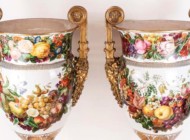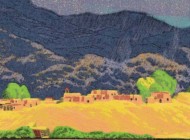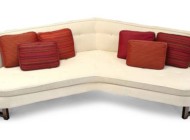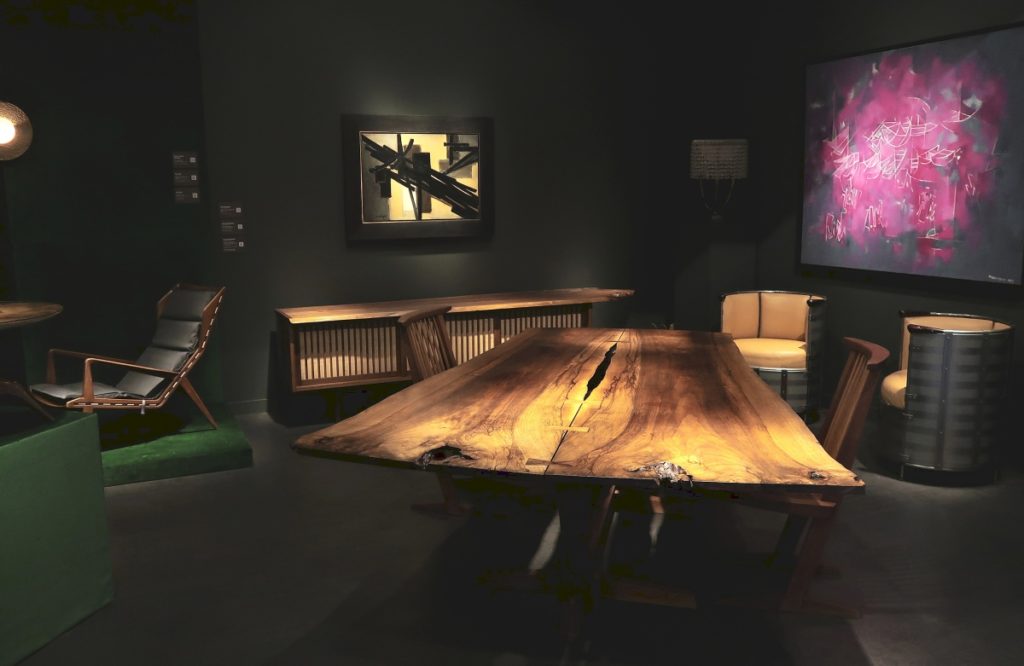
A 1969 “Conoid” dining set by George Nakashima included a table and 10 chairs. Geoffrey Diner Gallery, Washington DC.
Review and Photos by Laura Beach
NEW YORK CITY – A festive Winter Show celebrated its 69th season with a return to its longtime venue, the Park Avenue Armory. Cancelled in 2021 and postponed in 2022, the show, to the delight of exhibitors and patrons, in 2023 embraced its traditional bastion on New York’s Upper East Side, strewing the historic armory with sprays of lilies and roses on opening night, January 19, and beckoning visitors with a lively program of receptions, talks and tours through closing hours on January 29.
“The fair this year captures its early-to-late dateline more gracefully than ever,” remarked Elizabeth Feld, managing director of Hirschl & Adler Galleries, noting the Winter Show’s evolution over time from what was once primarily a showcase for American fine and decorative arts to a global presentation of the ancient, modern and everything in between. In all, 68 exhibitors from 10 countries participated in the event produced by and for charity beneficiary East Side House Settlement.
The Winter Show this year welcomed 15 new exhibitors, a high number for a production that historically has seen little turnover. Rising production costs have spurred some departures. The show’s popular executive director, Helen Allen, explained, “Booth rents need to support the rental of the Armory and other costs associated with doing the show. We’ve seen increased prices for rent, labor, shipping, materials such as wood and wall fabrics, and inflation.”
Innovations that began as experiments at last year’s fair, installed at the former Barney’s department store when the armory wasn’t available, included a pop-up museum loan show and three stand-alone designer vignettes. Allen elaborated, “We were thrilled this year to partner with the Museum of Chinese in America, just as we were thrilled to have the American Folk Art Museum’s stunning quilts at Barney’s. We are always interested in promoting our institutional partners and remain flexible on the question of whether a loan show in the front, center space returns another year.”
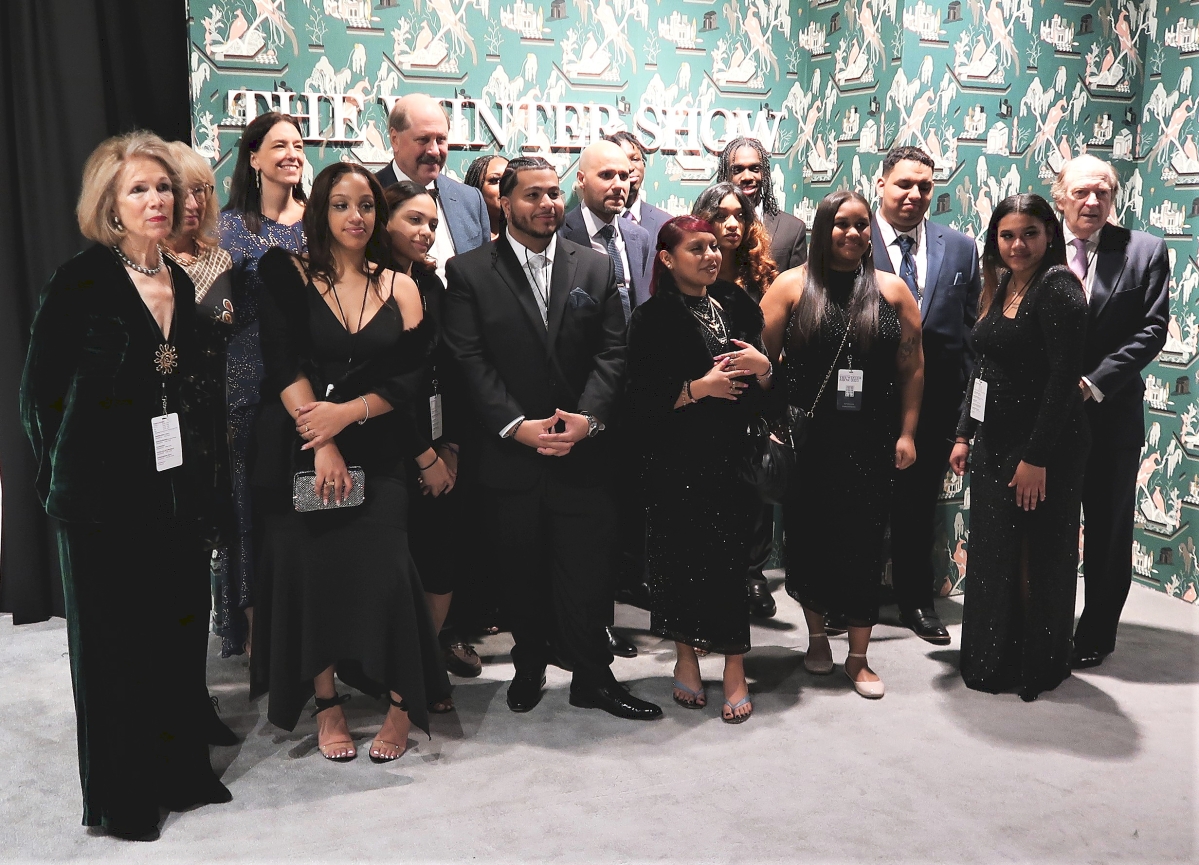
Organizers and volunteers on opening night. At far right and left are Winter Show co-chairs Lucinda C. Ballard and Michel R. Lynch. The show’s executive director, Helen Allen, is third from left. Center is Daniel Diaz, East Side House Settlement executive director.
This year, that space was instead occupied by Bernard Goldberg Fine Arts, offering a spectacular array of fine and decorative arts, most of American vintage. “It is very rare to get a lifetime bronze by Auguste Rodin. The Metropolitan Museum of Art has one,” Goldberg said proudly of his small, bronze figure of Pierre de Wiessant, one of Rodin’s burghers of Calais. At the show’s entrance and also offered by Goldberg was the Jacques Lipschitz bronze “Lesson of a Disaster,” conceived as a phoenix to commemorate the recreation of the artist’s studio after a devastating fire.
From Lowell Lisbon & Jonny Yarker to Hirschl & Alder Galleries and Thomsen Gallery, other dramatic presentations circled the large bar at center court. One belonged to the garden antiques authority Barbara Israel, who wrapped her stand with a large blow-up of the 1848 painting “Kindred Spirits” by Asher B. Durand, thus prompting an intriguing exchange between the painting’s subjects, Thomas Cole and William Cullen Bryant, and the carved stone figure of Prince Albert, circa 1860. Durand’s aerie of eagles circled above Israel’s own American zinc pilot-house example of circa 1880.
“Our opening night sales included the eagle, two fruit-basket finials, the little bird house and the big urn in the center of our booth. We have holds on our carved marble benches and our cast iron Coalbrookdale Nasturtium seat,” Israel told us several days into the show.
Maison Gerard cloaked its stand in mystery, inviting visitors to enter its display through a pair of painted Moroccan doors dating to the late Eighteenth or early Nineteenth Century. Inside its booth, buyers encountered an absorbing array of European antiques and contemporary design. Principal Benoist F. Drut reflected, “Like many others, I believe the show has never looked so good, and there is a renewed energy among the dealers and public. We worked hard to assemble a booth presentation in our signature style of blending old with new. We have been pleased with the response.”
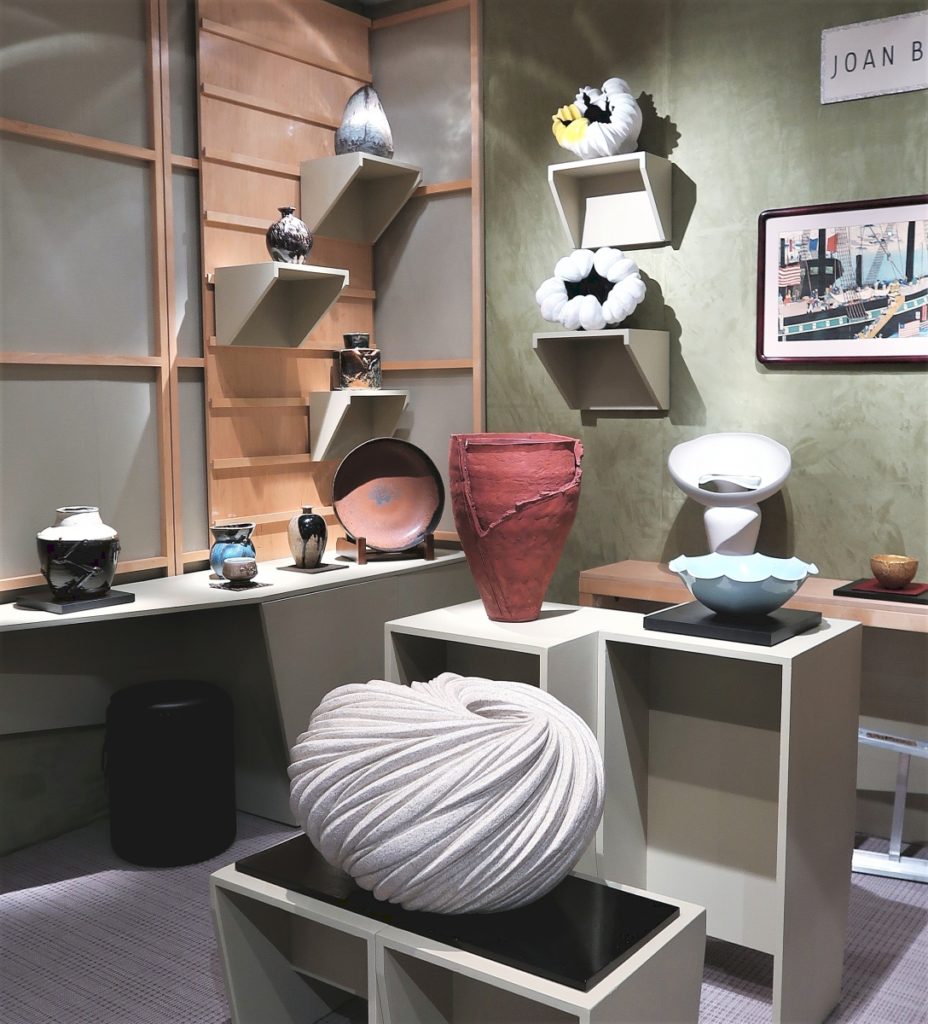
New York dealer Joan B. Mirviss presented the special exhibition “10 x 10 Past And Present: Japanese Masters of Ceramics.”
“I’d always wanted a little more room,” said Arlie Sulka of Lillian Nassau LLC, who this year moved to the front of the fair with early to mid-Twentieth Century American masterworks by Tiffany, Nakashima and others. Much admired were two leaded glass windows, one designed by Frank Lloyd Wright for the Darwin O. Martin house, the other a rare “Snowball” design by Tiffany Studios. Both dated to about 1905.
With fewer dealers in American decorative arts and folk art, returning specialists in the category did double duty. This year sporting a handsomely traditional installation, Levy Galleries got off to a brisk start, selling a circa 1770 Boston mahogany accordion-action card table included in the Met’s 1992 exhibition “American Rococo, 1750-1775: Elegance in Ornament” and formerly belonging to Erving and Joy Wolf. Levy also wrote up its Potter family Chippendale tall case clock, a Providence, R.I., example of 1785; two pairs of side chairs; a worktable; and a captivating folk watercolor of the DeWolf family of Bristol, R.I.
“Last night I got a call from a serious person about my banjo clock,” said proprietor Frank Levy, happy to be back in the Armory and pleased that collectors are feeling more urgency about making purchase decisions.
Thistlethwaite Americana packed its display with American furniture, sculpture and folk paintings. “This is the only signed example known,” Taylor Thistlethwaite explained of his “Horse Jumping Through A Hoop” weathervane stamped Jewell. He also offered an “American Girl” horse and sulky weathervane attributed to J.W. Fiske and Company and a pair of circa 1900 English cast zinc recumbent greyhounds with unsurpassed patina.
-1024x782.jpg)
Daniel Crouch Rare Books of London invoked the night sky with 500 years of celestial artifacts. Above center, a late medieval/early Renaissance volvelle astronomical calendar from the San Zeno cloister, circa 1455.
“I’ve sold something every day, which is always a good feeling. My circa 1760 Boston ball-and-claw foot corner chair went to a nice young collector, which was good to see, and the greyhounds found a new home,” Thistlethwaite said.
“I started to collect cars about 10 years ago and attend many specialty shows and auctions,” noted Pennsylvania dealer Kelly Kinzle, who drove into his stand with his eye-caching showpiece, a 1929 Art Deco masterpiece roadster called “The Commodore,” designed by Isotta Fraschini and Carrozzeria Castagna.
“I brought my nicest examples of American furniture and Regency lighting,” said new exhibitor Charles Clark, a specialist in Classical American furniture and English lighting. Dazzling overhead was a Regency four-light suspended argand, attributed to Johnston Brooks & Co, England, circa 1825. The Connecticut dealer wrote up a Grecian sofa table attributed to Duncan Phyfe, a Philadelphia library chair in the Gothic taste, a Grand Tour painting and assorted lighting.
“Don’t miss our John Singer Sargent painting, ‘Lady Seated by an Alpine Pool,'” Elizabeth Feld urged a visitor, motioning toward a brushy oil on canvas on Hirschl & Adler’s outside wall. Eschewing his traditional society-portrait approach, Sargent here foreshadows modernism in his flecked rendering of about 1909-11.
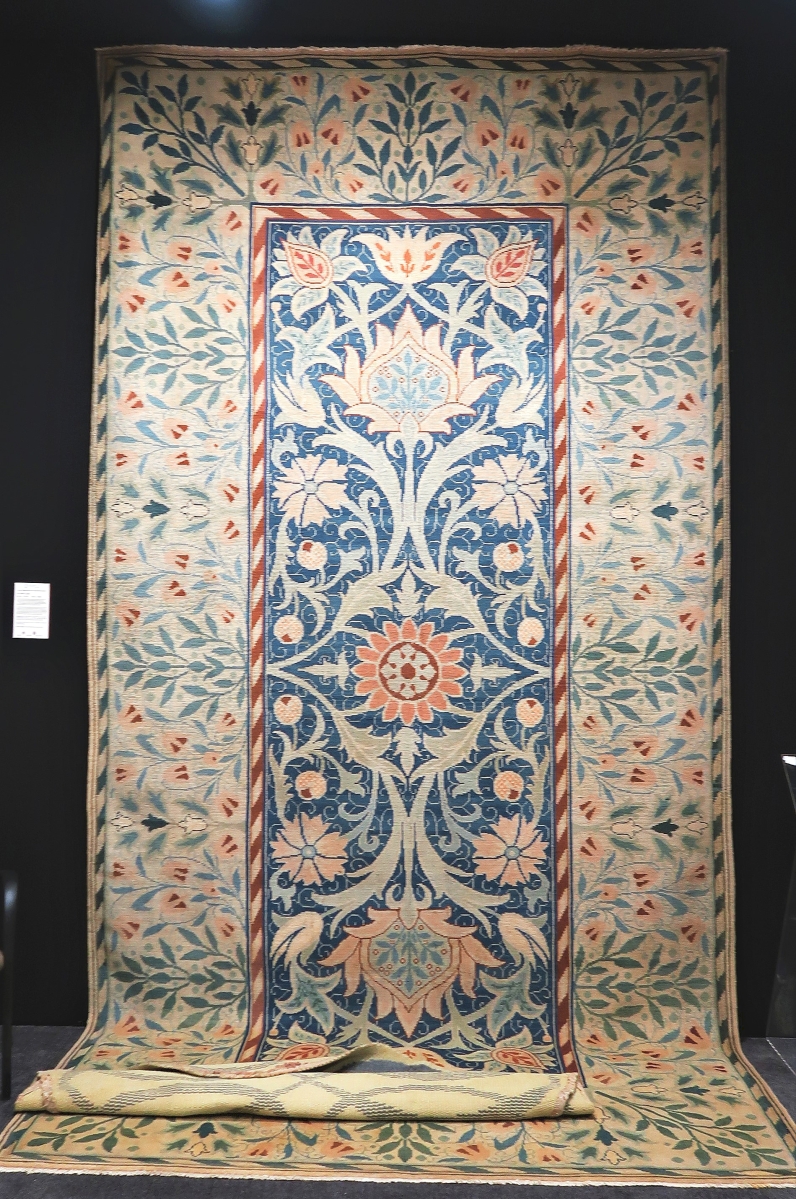
“Hammersmith” carpet by William Morris, circa 1880-90. Keshishian, London.
Debra Force Fine Art stopped traffic with Robert Laurent’s 1942 carved mahogany sculpture “Hero and Leander” and “The Elders,” an arresting mixed-media double portrait on paper by Romare Bearden. “We have museums looking at the Laurent and the Bearden, and have private interest in our John Marin. The Mary Elizabeth Prince, our rare terracotta sculpture by Annetta St Gaudens, our Thomas Sully portrait and the two George Tookers are also getting a lot of attention. We’ve been very pleased by the crowd and have a number of private buyers who are going to circle back,” Force said midweek.
Joining works by John Singer Sargent, Mary Cassatt, Thomas Eakins and Andrew Wyeth at Adelson Galleries was the dye on carved and tooled leather “Loading Up Cotton Bags” by Winfred Rembert, whose work “The Black Cat” achieved a record price at auction at Christie’s concurrent sale of Outsider and Vernacular Art.
Arraying American and European works of art, Thomas Colville opened with sales of a Boudin oil and a Paris view by Henri-Joseph Harpignies.
Known for maritime, wildlife, sporting and topographical art, UK dealers Rountree Tryon Galleries reported the sale of the oil on canvas “Lion and Lioness” by German painter Wilhelm Kuhnert and “Intercepting Doodlebugs over the South Coast, 1944,” a war painting by Frank Owen Salisbury, an English portrait artist known for painting six American presidents and, most famously, Winston Churchill.
-756x1024.jpg)
“Waterloo Elm” chair by Thomas Chippendale the younger, English, circa 1820, ex-collection of John Bryan Jr. H. Blairman and Sons, Ltd, London.
Management’s outreach to institutions proved especially effective this year, with many exhibitors reporting sales and serious interest from American museums. Allen noted, “We host an insiders’ preview for museum and design professionals on the first Friday of the show. We had 490 RSVPs for the event.”
Old Masters pictures dealer Robert Simon, who organized the special exhibit “Heroines of the Brush: Women Artists from the Renaissance to the 20th Century,” shared, “We are having a terrific show – actually the best we’ve ever done. Particularly gratifying to us were three reserves from American museums, as well as purchases from first-time buyers. The fact that Sotheby’s and Christie’s had their Old Masters sales again at the same time helped bring European visitors and American curators to New York. Then there was the overall quality of the Winter Show and the freedom so many people now feel to go out, see works of art in person, and maybe acquire something after two years of staying at home.”
Specialists in African, Oceanic and Northwest Coast art, Tambaran Gallery sold “Son of Stone,” a 2015 contemporary mixed-media and quillwork piece by Dwayne Wilcox (Oglala Lakota), to a New York City museum. A Fijian club, ancient terracotta head from Mexico and a 1974 painting on board by Australian artist Tim Leura Tjapaltjarri went to private buyers.
Joan Mirviss Ltd placed a glazed-stoneware vessel of 2022 by Sakiyama Takayuki, who carved diagonally incised folds into the highly sculptural piece titled, “Chōtō; Listening to the Waves.” The massive pot was a centerpiece of the New York dealer’s special presentation, “10 x 10 Past and Present: Japanese Masters of Ceramics.” Also sold were vessels by Kawase Shinobu and Hamada Shoji.
2-931x1024.jpg)
Two circa 1905 leaded glass windows, the example at left from the Darwin O. Martin residence by Frank Lloyd Wright. Right, sold, a “Snowball” window by Tiffany Studios. Lillian Nassau LLC, New York City.
“It’s the nicest ice bowl we’ve ever had,” exhibitors Spencer Gordon and Mark McHugh said of the 1877 Tiffany & Co sterling silver figural vessel decorated with cast walruses and ice floes. Other highlights included a 1905 silver and gold fruit compote by Arthur Stone, perhaps the most important piece of its kind still on the market, and a gilt-silver ice cream service from “The Mackay Service,” designed by Tiffany & Co. for “Silver King” John Mackay and exhibited at the 1878 Paris International Exposition.
“The show’s been great. The crowd is thrilled we’re back,” said Mark McHugh, confirming sales of the ice-cream service, ice bowl and a three-piece mixed-metal Tiffany tea set. The firm transacted two institutional sales; other museum sales were pending.
S.J. Shrubsole’s eye-catching presentation included a collection of two-handled silver and silver-gilt cups, some with covers and dating from around 1660 to 1780. Of particular note was one by Thomas Heming.
Daniel Crouch invoked the heavens. Against a backdrop suggesting the night sky, the London dealer arrayed maps, atlases, photographs, globes, planetaria and other scientific instruments. The works ranged from the 1455 San Zeno Calendar, an astronomical chart designed to calculate dates of festivals and feasts, to a 1968 photograph of an earth rise taken aboard Apollo 8, the first manned voyage to orbit the moon.
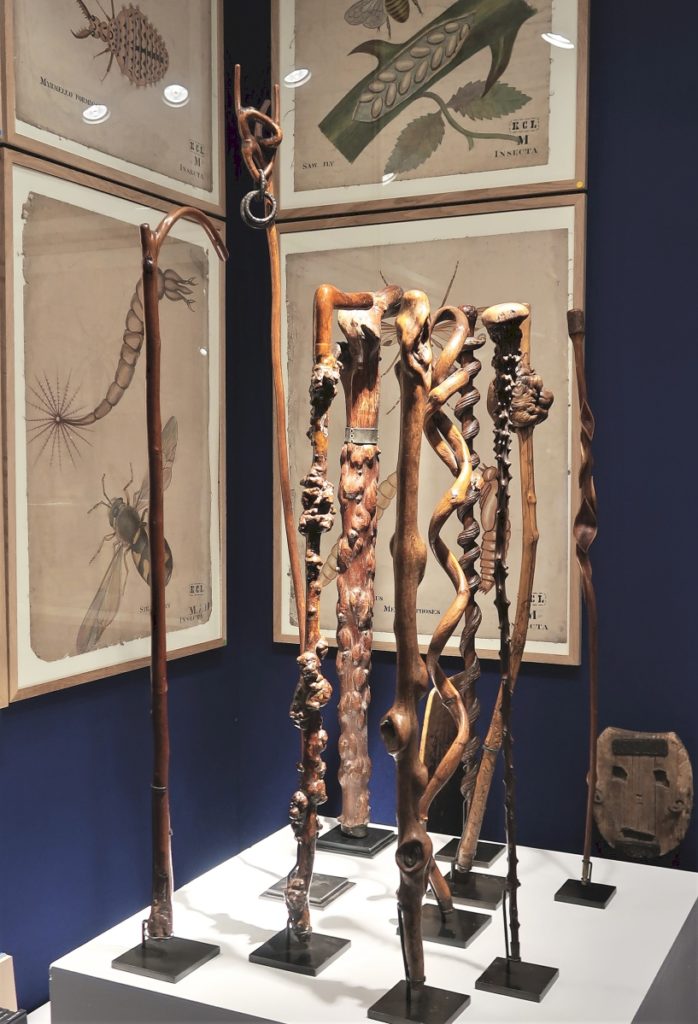
Patrick & Ondine Mestdagh, Brussels.
“The show has been good for us,” reported Harry Newman of The Old Print Shop, ticking off sales of a Centennial flag, a Lincoln proclamation, an engraving of “Washington Crossing the Delaware” after Emanuel Leutze and a set of circa 1710 mezzotint engravings called “Four Indian Kings of America” by John Verelst. The latter commemorate the visit to London by four Native American chiefs, a venture arranged by Pieter Schuyler, first mayor of Albany and occasional governor of New York.
“We’ve made four, five and six-figure sales, to collectors, designers and institutions,” confirmed London dealer Martin Levy. H. Blairman & Son’s director showcased an important brass-inlaid rosewood and ebony cabinet with gilt-lacquered bronze mounts designed and made by London cabinetmaker George Bullock around 1815.
A George III ormolu-mounted white marble bacchanalian vase by Matthew Boulton and a George III gilt-gesso center table of circa 1720 were twin splendors at London antiquary Ronald Phillips Ltd.
James Rolleston, also of London, livestreamed his display, training a mobile-phone camera on an important Charles II silvered mirror and a pair of carved and gilded candelabra designed by James “Athenian” Stuart and supplied, circa 1760, to Earl Spencer for the Painted Room at Spencer House in London.
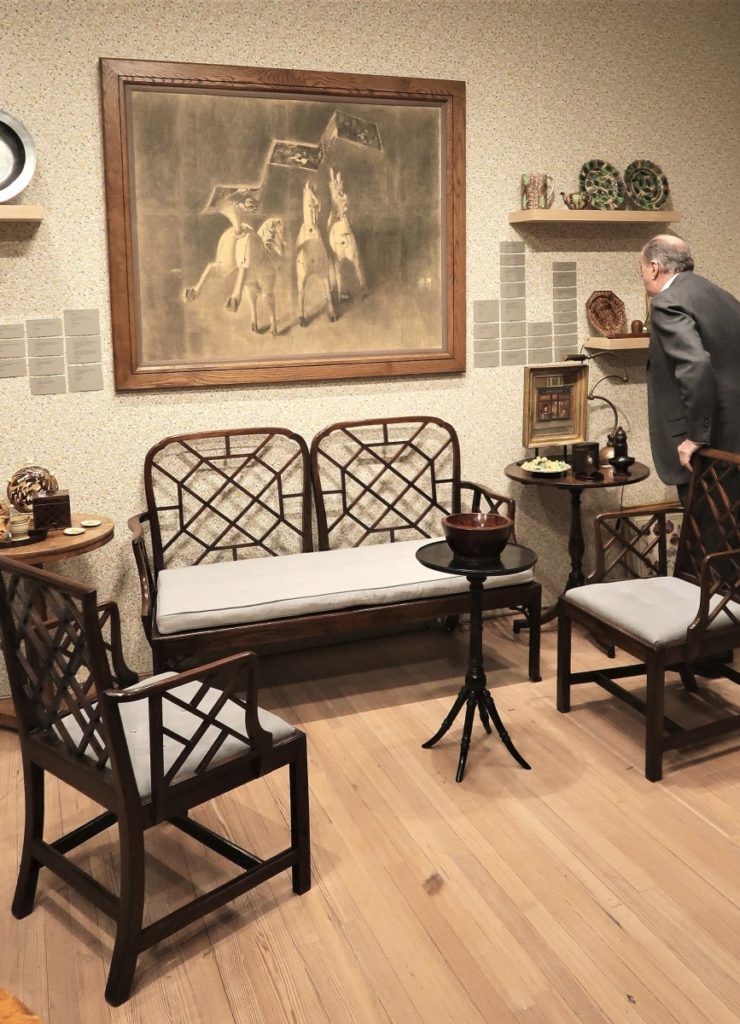
Cove Landing, New York City.
Cove Landing broke out in red spots on opening night, marking a slew of smalls and a painting sold.
“There isn’t a better collection of flower vases outside the Rijksmuseum,” said Dutch dealer Robert Aronson, gesturing to a group of blue and white Delft pottery vessels ranging in date from around 1690 to 1710. Particularly nice was a 1695 bowl with cover marked “AK” for Adrianus Kocx, owner of De Grieksche A (The Greek A) factory. Aronson’s sales included a pair of circa 1700 obelisk-form Delft flower vases to a private American collector.
Well-received were three Designer Vignettes mounted by Alex Papachristidis Interiors, Stephen Sills Associates and Bunny Williams Interior Design, and a partner booth organized by “Curious Objects” podcast host Benjamin Miller and The Magazine Antiques. All included objects sourced from exhibitors. Of the Designer Vignettes, Philadelphia Museum of Art curator Alexandra Kirtley remarked, “It’s a wonderful way to show the public how to decorate with art and antiques.”
Allen concluded, “Next year is the Winter Show’s 70th anniversary. We are planning a big, retrospective review.” Stay tuned, all.
For more information, go to www.thewintershow.org or call 917-860-6559.























.jpg)























.jpg)



2.jpg)




